
starknet-agent-kit
A toolkit for creating AI agents that can interact with the Starknet blockchain
Stars: 56
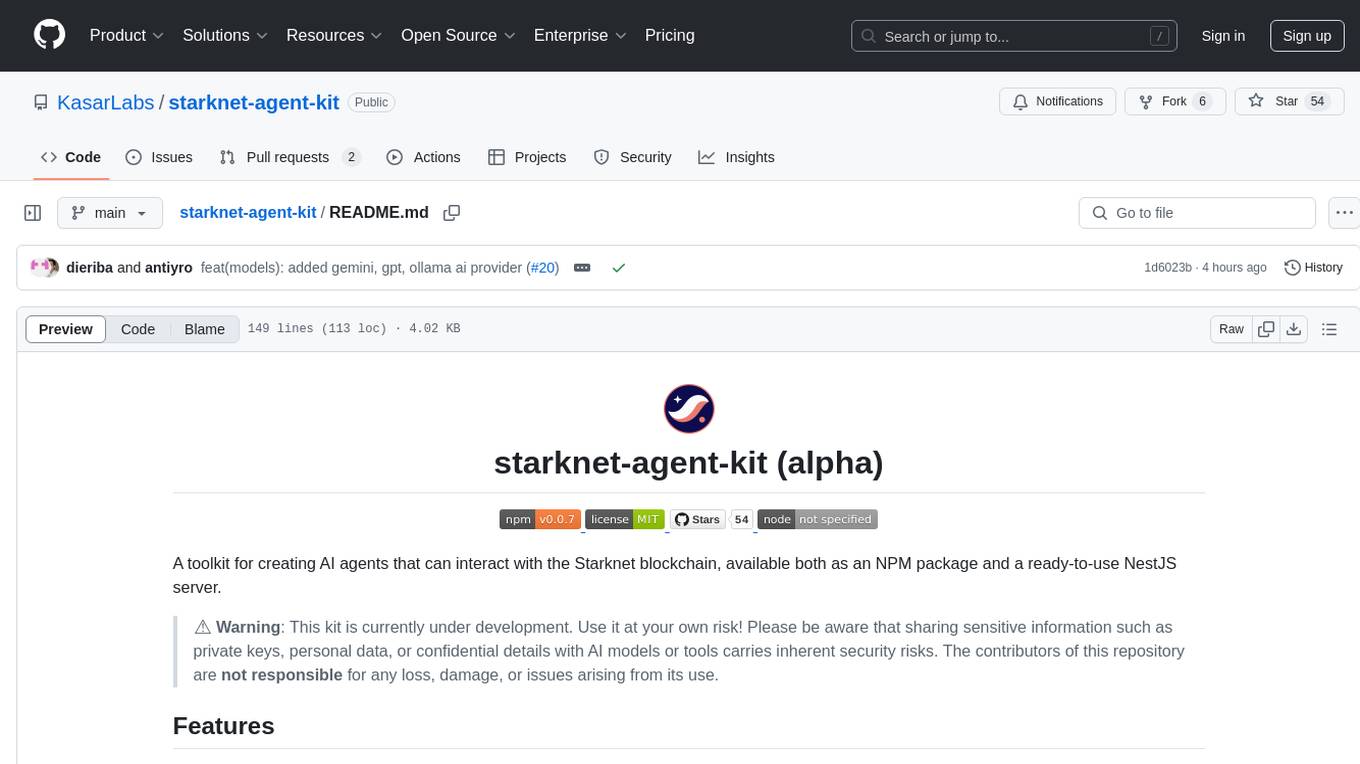
starknet-agent-kit is a NestJS-based toolkit for creating AI agents that can interact with the Starknet blockchain. It allows users to perform various actions such as retrieving account information, creating accounts, transferring assets, playing with DeFi, interacting with dApps, and executing RPC read methods. The toolkit provides a secure environment for developing AI agents while emphasizing caution when handling sensitive information. Users can make requests to the Starknet agent via API endpoints and utilize tools from Langchain directly.
README:
A toolkit for creating AI agents that can interact with the Starknet blockchain, available both as an NPM package and a ready-to-use NestJS server with a web interface.
⚠️ Warning: This kit is currently under development. Use it at your own risk! Please be aware that sharing sensitive information such as private keys, personal data, or confidential details with AI models or tools carries inherent security risks. The contributors of this repository are not responsible for any loss, damage, or issues arising from its use.
- Retrieve account information (Balance, public key, etc.)
- Create one or multiple accounts (Argent & OpenZeppelin)
- Transfer assets between accounts
- DeFi operations (Swap on Avnu)
- dApp interactions (Create a .stark domain)
- All RPC read methods supported (getBlockNumber, getStorageAt, etc.)
- Web interface for easy interaction
- Full API server implementation
npm install starknet-agent-kitRequired peer dependencies:
npm install @nestjs/common @nestjs/core @nestjs/platform-fastify starknet @langchain/anthropic- Clone the repository:
git clone https://github.com/kasarlabs/starknet-agent-kit.git
cd starknet-agent-kit- Install dependencies:
pnpm install- Run the setup script:
pnpm run setupThis will install all dependencies and build both the backend and frontend.
You will need:
- A Starknet wallet private key (you can get one from Argent X)
- An AI provider API key (supported providers: Anthropic, OpenAI, Google (Gemini), Ollama)
import { StarknetAgent } from 'starknet-agent-kit';
const agent = new StarknetAgent({
aiProviderApiKey: 'your-ai-provider-key',
aiProvider: 'anthropic', // or 'openai', 'gemini', 'ollama'
aiModel: 'claude-3-5-sonnet-latest',
walletPrivateKey: 'your-wallet-private-key',
rpcUrl: 'your-rpc-url',
});
// Execute commands in natural language
await agent.execute('transfer 0.1 ETH to 0x123...');
await agent.execute('What is my ETH balance?');
await agent.execute('Swap 5 USDC for ETH');All Langchain tools are available for direct import:
import { getBalance, transfer, swapTokens } from 'starknet-agent-kit';
// Use tools individually
const balance = await getBalance(address);Create a .env file:
# Required for both package and server
PRIVATE_KEY=""
PUBLIC_ADDRESS=""
AI_PROVIDER_API_KEY=""
AI_MODEL="" # e.g., "claude-3-5-sonnet-latest"
AI_PROVIDER="" # "anthropic", "openai", "gemini", or "ollama"
RPC_URL=""
# Required only for server
API_KEY="" # Security key for API endpoints
PORT=3001 # Optional, defaults to 3000# Install dependencies first (if not done already)
pnpm install
# Start both frontend and backend
pnpm run dev
# Start only frontend
pnpm run dev --frontend-only
# Start only backend
pnpm run dev --backend-only# Install dependencies first (if not done already)
pnpm install
# Start both frontend and backend
pnpm run start
# Start only frontend
pnpm run start --frontend-only
# Start only backend
pnpm run start --backend-onlycurl --location 'localhost:3001/api/agent/request' \
--header 'x-api-key: your-api-key' \
--header 'Content-Type: application/json' \
--data '{
"request": "What's my ETH balance?"
}'# Run unit tests
pnpm test
# Run frontend tests
pnpm test:frontend
# Run end-to-end tests
pnpm test:e2eContributions are welcome! Please feel free to submit a Pull Request.
This project is licensed under the MIT License - see the LICENSE file for details.
For Tasks:
Click tags to check more tools for each tasksFor Jobs:
Alternative AI tools for starknet-agent-kit
Similar Open Source Tools

starknet-agent-kit
starknet-agent-kit is a NestJS-based toolkit for creating AI agents that can interact with the Starknet blockchain. It allows users to perform various actions such as retrieving account information, creating accounts, transferring assets, playing with DeFi, interacting with dApps, and executing RPC read methods. The toolkit provides a secure environment for developing AI agents while emphasizing caution when handling sensitive information. Users can make requests to the Starknet agent via API endpoints and utilize tools from Langchain directly.
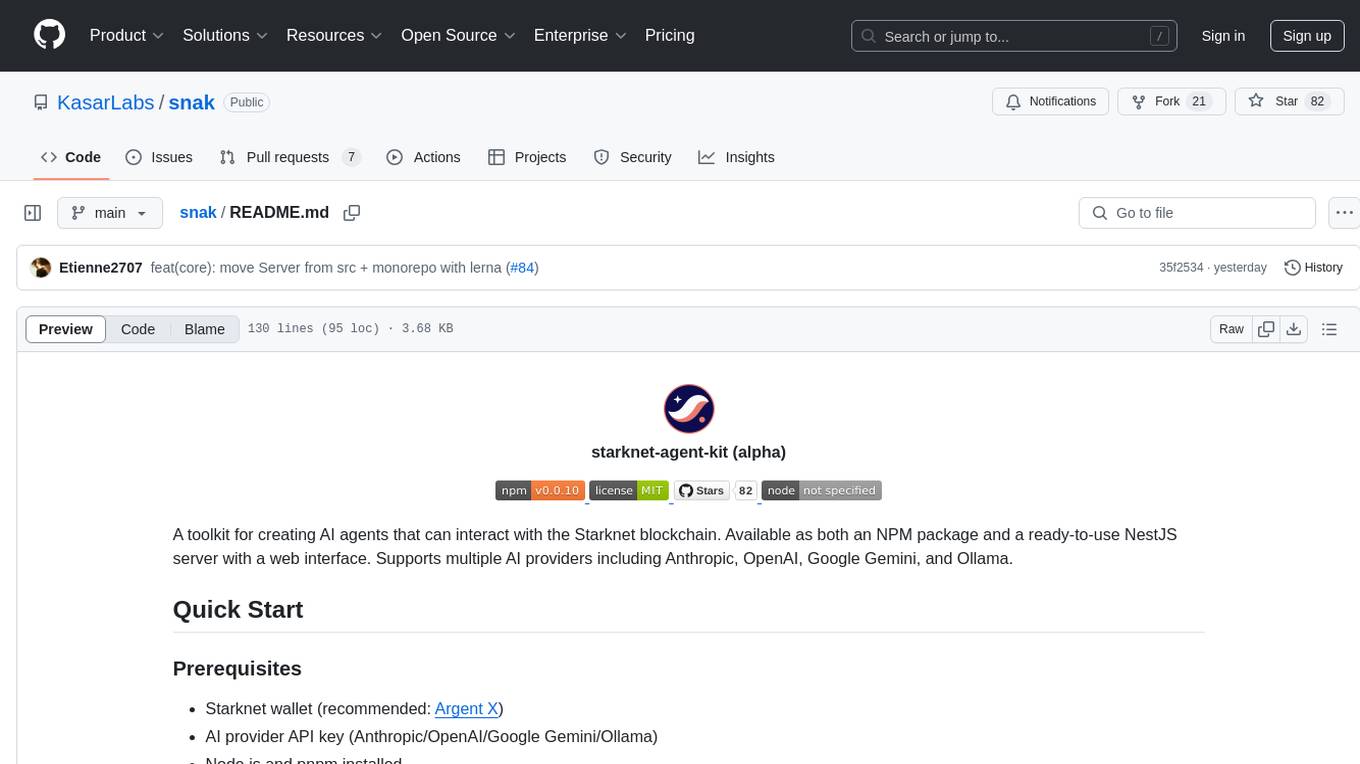
snak
The starknet-agent-kit is a toolkit designed for creating AI agents that can interact with the Starknet blockchain. It provides support for multiple AI providers such as Anthropic, OpenAI, Google Gemini, and Ollama. The kit includes an NPM package and a NestJS server with a web interface. Users can run the server in different modes like Chat Mode for conversations, checking balances, executing transfers, and managing accounts, as well as Autonomous Mode for automated monitoring. Additionally, the kit offers a library mode for more advanced usage, allowing users to interact with the StarknetAgent class for executing specific actions. The kit aims to simplify the process of integrating AI capabilities with blockchain interactions.
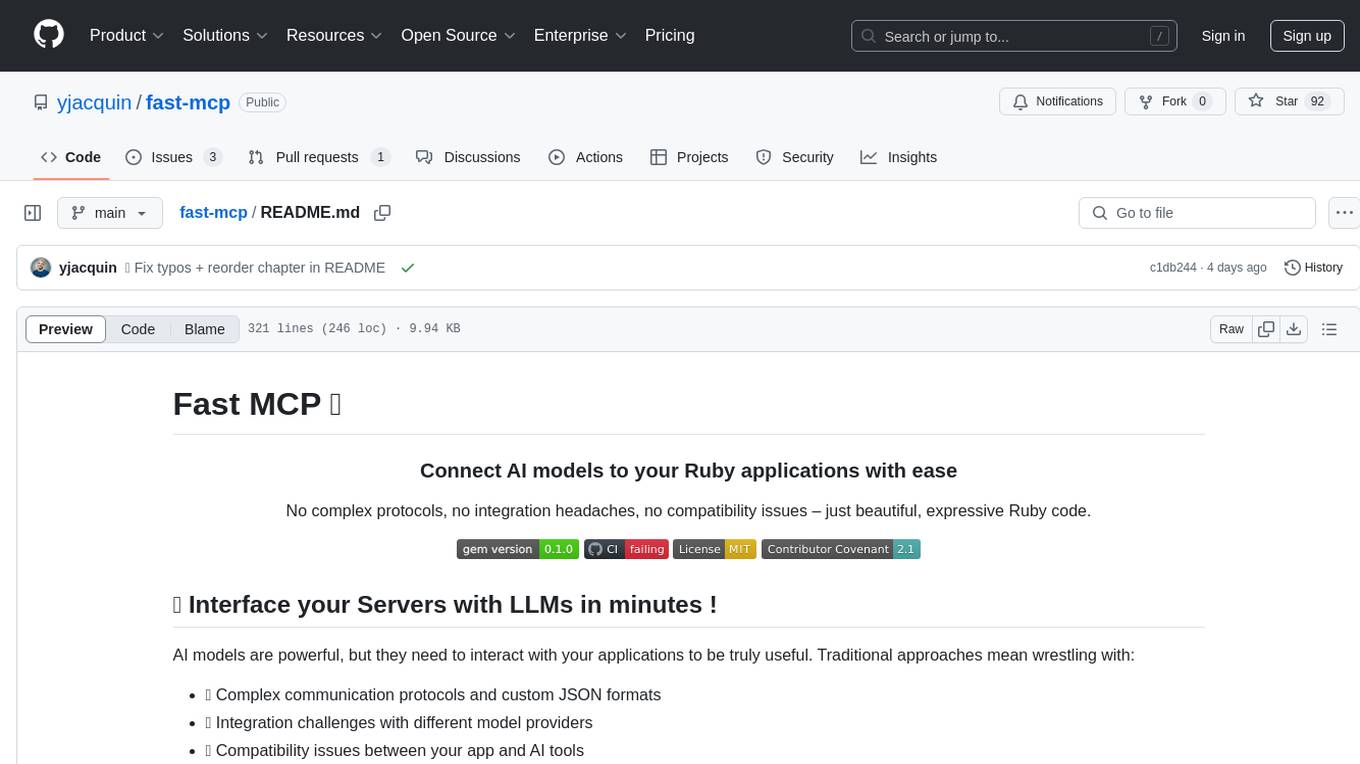
fast-mcp
Fast MCP is a Ruby gem that simplifies the integration of AI models with your Ruby applications. It provides a clean implementation of the Model Context Protocol, eliminating complex communication protocols, integration challenges, and compatibility issues. With Fast MCP, you can easily connect AI models to your servers, share data resources, choose from multiple transports, integrate with frameworks like Rails and Sinatra, and secure your AI-powered endpoints. The gem also offers real-time updates and authentication support, making AI integration a seamless experience for developers.
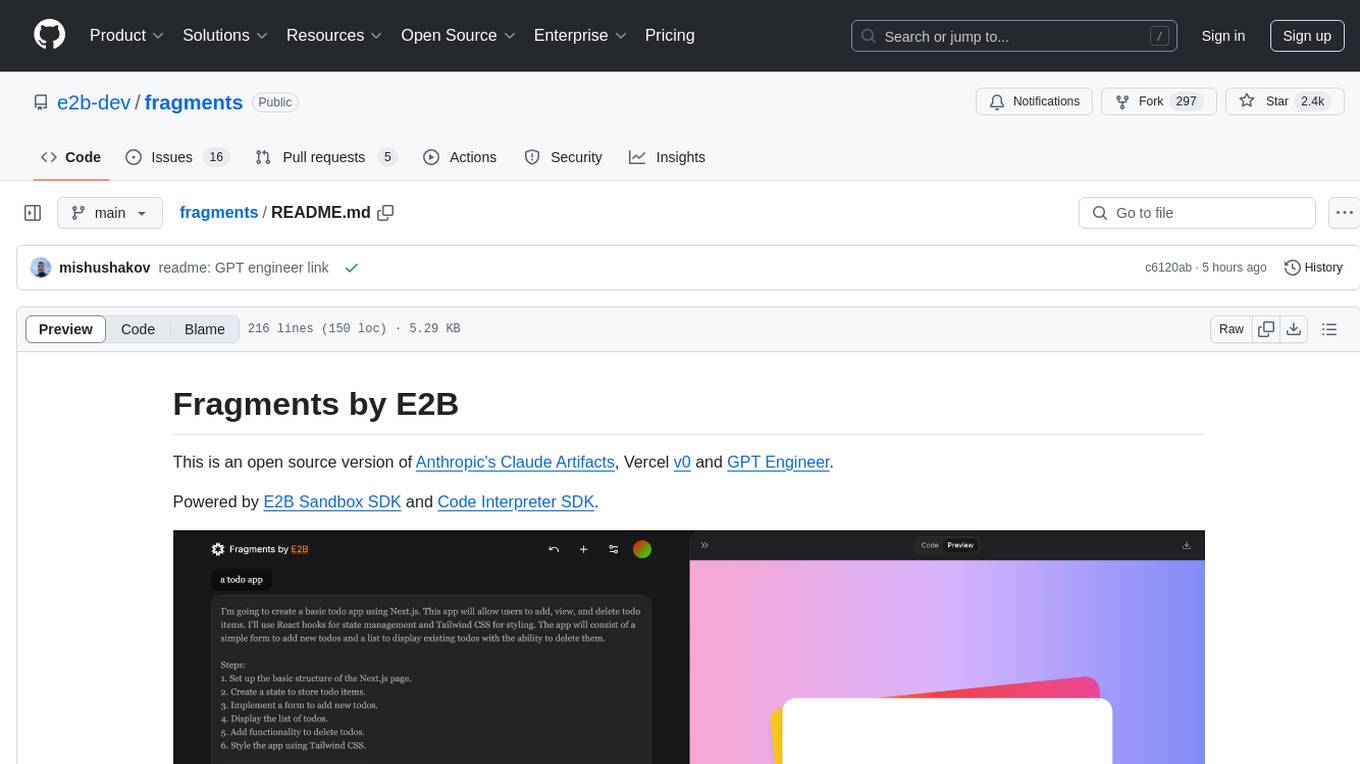
fragments
Fragments is an open-source tool that leverages Anthropic's Claude Artifacts, Vercel v0, and GPT Engineer. It is powered by E2B Sandbox SDK and Code Interpreter SDK, allowing secure execution of AI-generated code. The tool is based on Next.js 14, shadcn/ui, TailwindCSS, and Vercel AI SDK. Users can stream in the UI, install packages from npm and pip, and add custom stacks and LLM providers. Fragments enables users to build web apps with Python interpreter, Next.js, Vue.js, Streamlit, and Gradio, utilizing providers like OpenAI, Anthropic, Google AI, and more.

openai-kotlin
OpenAI Kotlin API client is a Kotlin client for OpenAI's API with multiplatform and coroutines capabilities. It allows users to interact with OpenAI's API using Kotlin programming language. The client supports various features such as models, chat, images, embeddings, files, fine-tuning, moderations, audio, assistants, threads, messages, and runs. It also provides guides on getting started, chat & function call, file source guide, and assistants. Sample apps are available for reference, and troubleshooting guides are provided for common issues. The project is open-source and licensed under the MIT license, allowing contributions from the community.
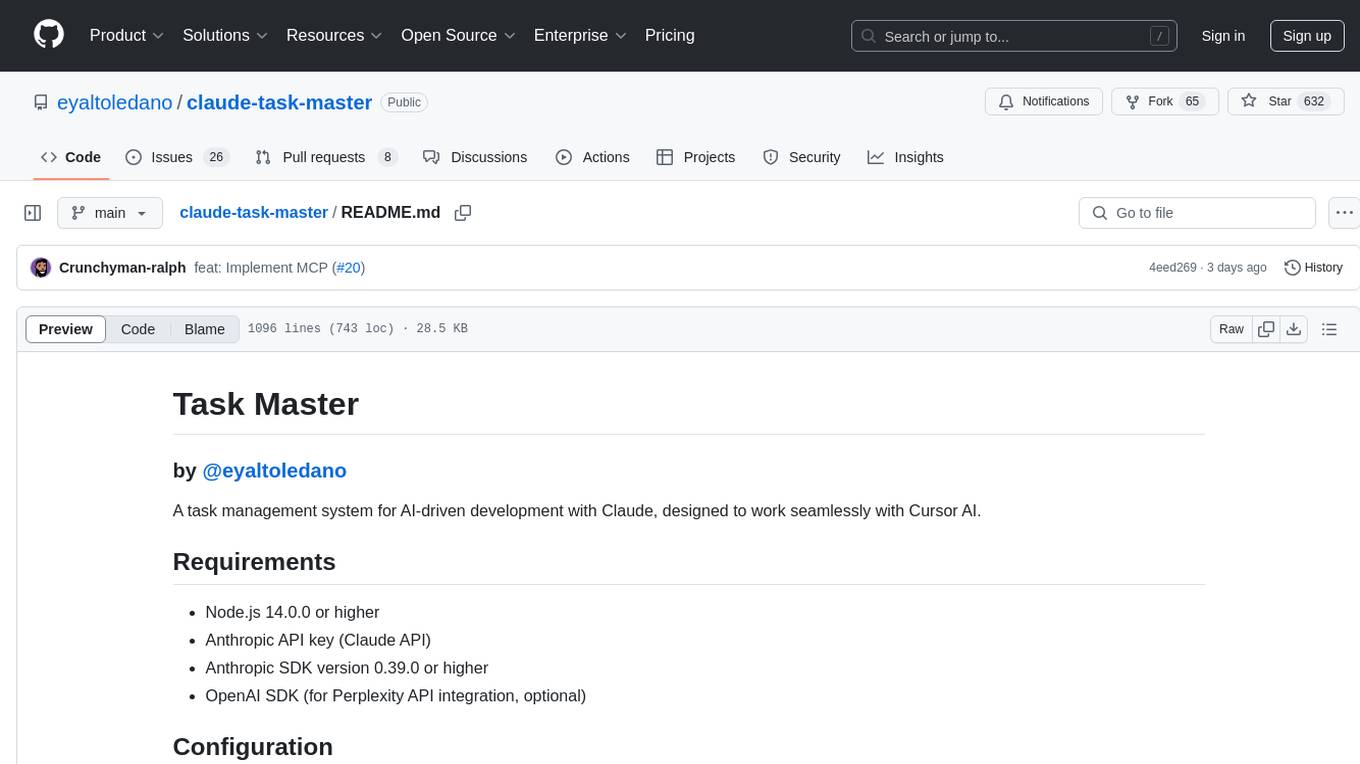
claude-task-master
Claude Task Master is a task management system designed for AI-driven development with Claude, seamlessly integrating with Cursor AI. It allows users to configure tasks through environment variables, parse PRD documents, generate structured tasks with dependencies and priorities, and manage task status. The tool supports task expansion, complexity analysis, and smart task recommendations. Users can interact with the system through CLI commands for task discovery, implementation, verification, and completion. It offers features like task breakdown, dependency management, and AI-driven task generation, providing a structured workflow for efficient development.
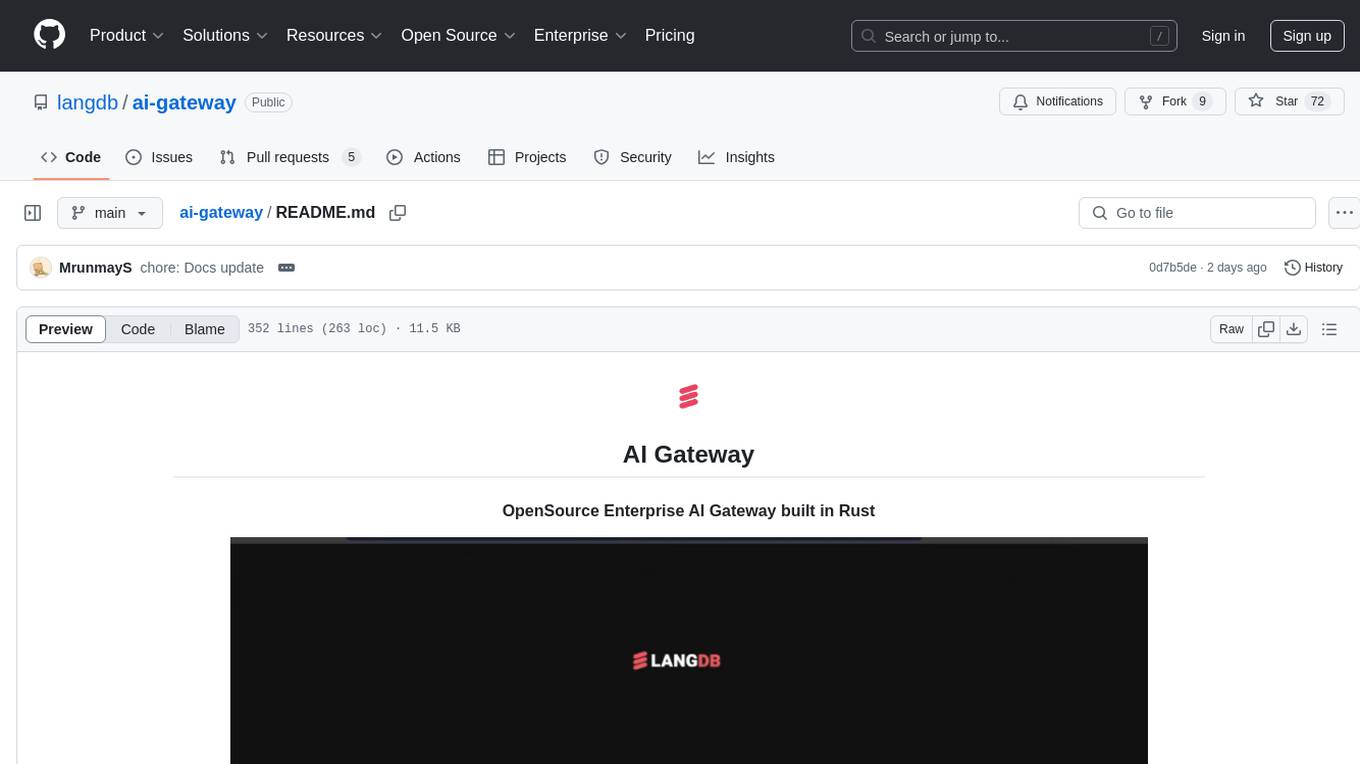
ai-gateway
LangDB AI Gateway is an open-source enterprise AI gateway built in Rust. It provides a unified interface to all LLMs using the OpenAI API format, focusing on high performance, enterprise readiness, and data control. The gateway offers features like comprehensive usage analytics, cost tracking, rate limiting, data ownership, and detailed logging. It supports various LLM providers and provides OpenAI-compatible endpoints for chat completions, model listing, embeddings generation, and image generation. Users can configure advanced settings, such as rate limiting, cost control, dynamic model routing, and observability with OpenTelemetry tracing. The gateway can be run with Docker Compose and integrated with MCP tools for server communication.
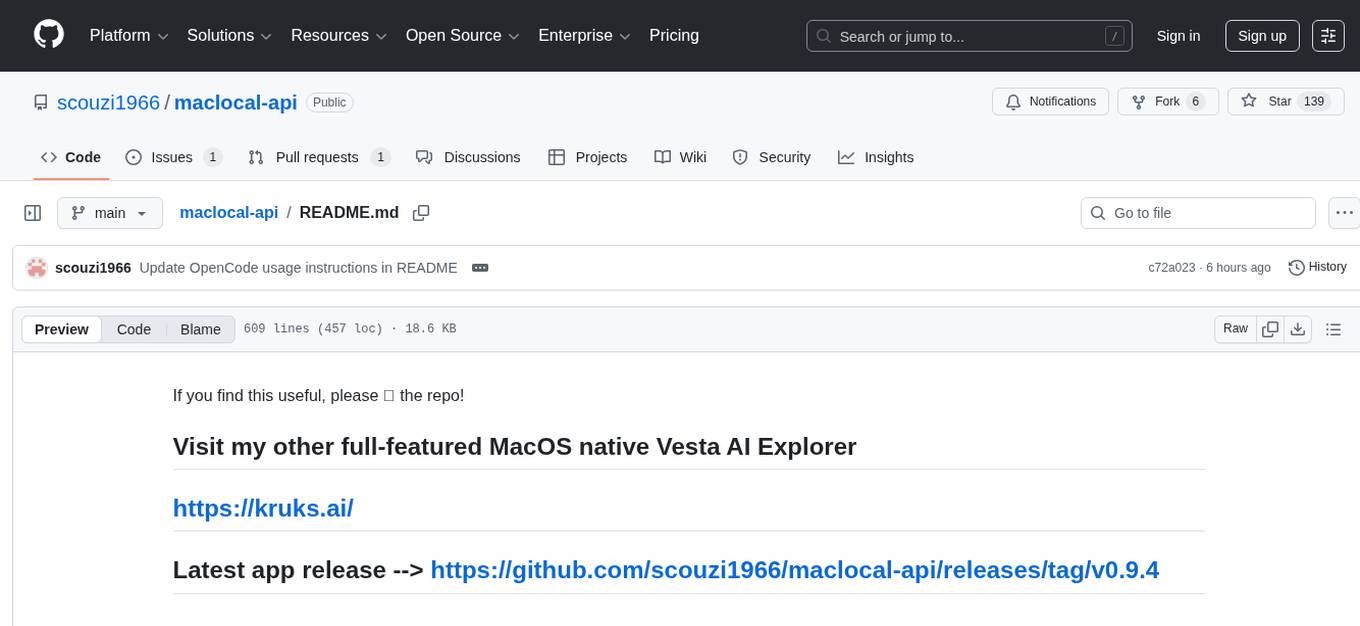
maclocal-api
MacLocalAPI is a macOS server application that exposes Apple's Foundation Models through OpenAI-compatible API endpoints. It allows users to run Apple Intelligence locally with full OpenAI API compatibility. The tool supports MLX local models, API gateway mode, LoRA adapter support, Vision OCR, built-in WebUI, privacy-first processing, fast and lightweight operation, easy integration with existing OpenAI client libraries, and provides token consumption metrics. Users can install MacLocalAPI using Homebrew or pip, and it requires macOS 26 or later, an Apple Silicon Mac, and Apple Intelligence enabled in System Settings. The tool is designed for easy integration with Python, JavaScript, and open-webui applications.
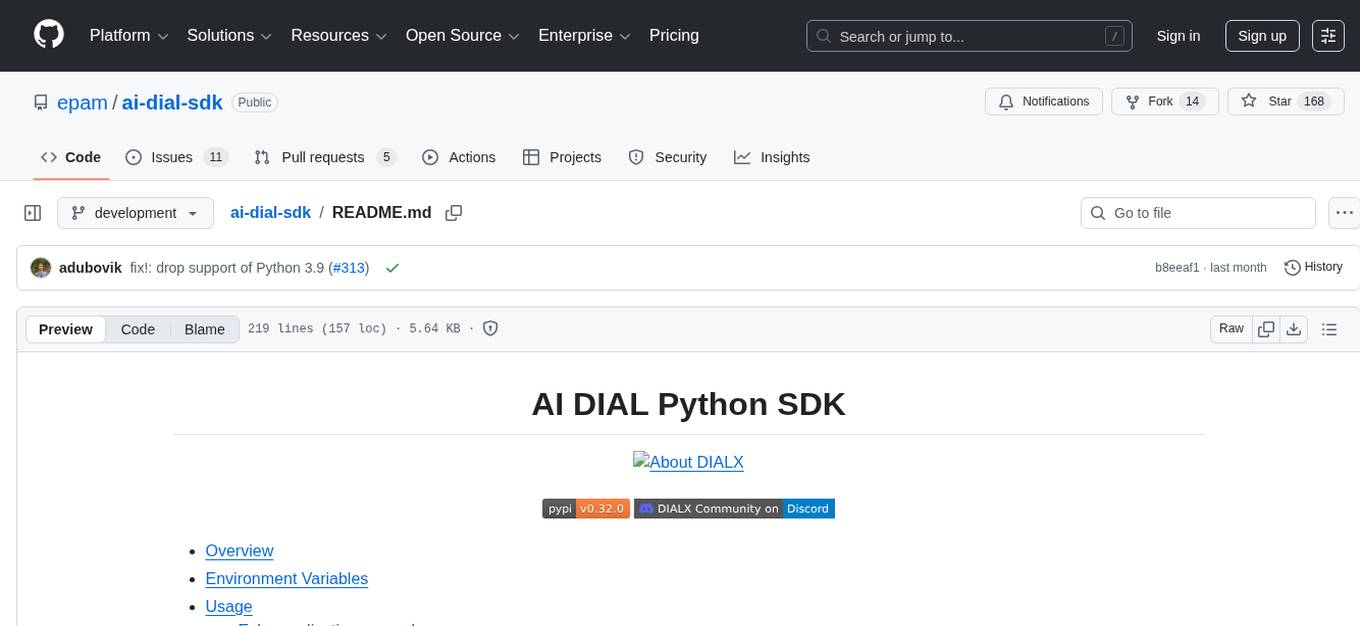
ai-dial-sdk
AI DIAL Python SDK is a framework designed to create applications and model adapters for AI DIAL API, which is based on Azure OpenAI API. It provides a user-friendly interface for routing requests to applications. The SDK includes features for chat completions, response generation, and API interactions. Developers can easily build and deploy AI-powered applications using this SDK, ensuring compatibility with the AI DIAL platform.
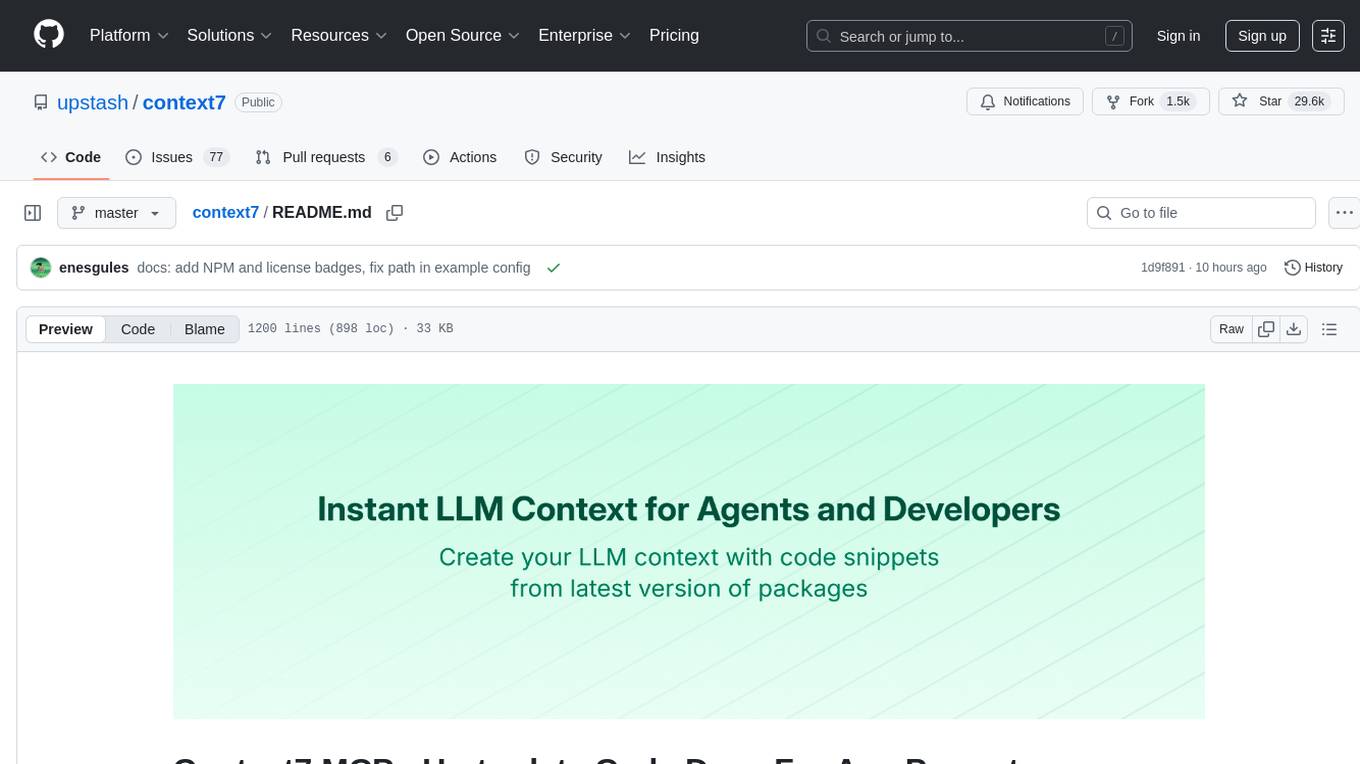
context7
Context7 is a powerful tool for analyzing and visualizing data in various formats. It provides a user-friendly interface for exploring datasets, generating insights, and creating interactive visualizations. With advanced features such as data filtering, aggregation, and customization, Context7 is suitable for both beginners and experienced data analysts. The tool supports a wide range of data sources and formats, making it versatile for different use cases. Whether you are working on exploratory data analysis, data visualization, or data storytelling, Context7 can help you uncover valuable insights and communicate your findings effectively.
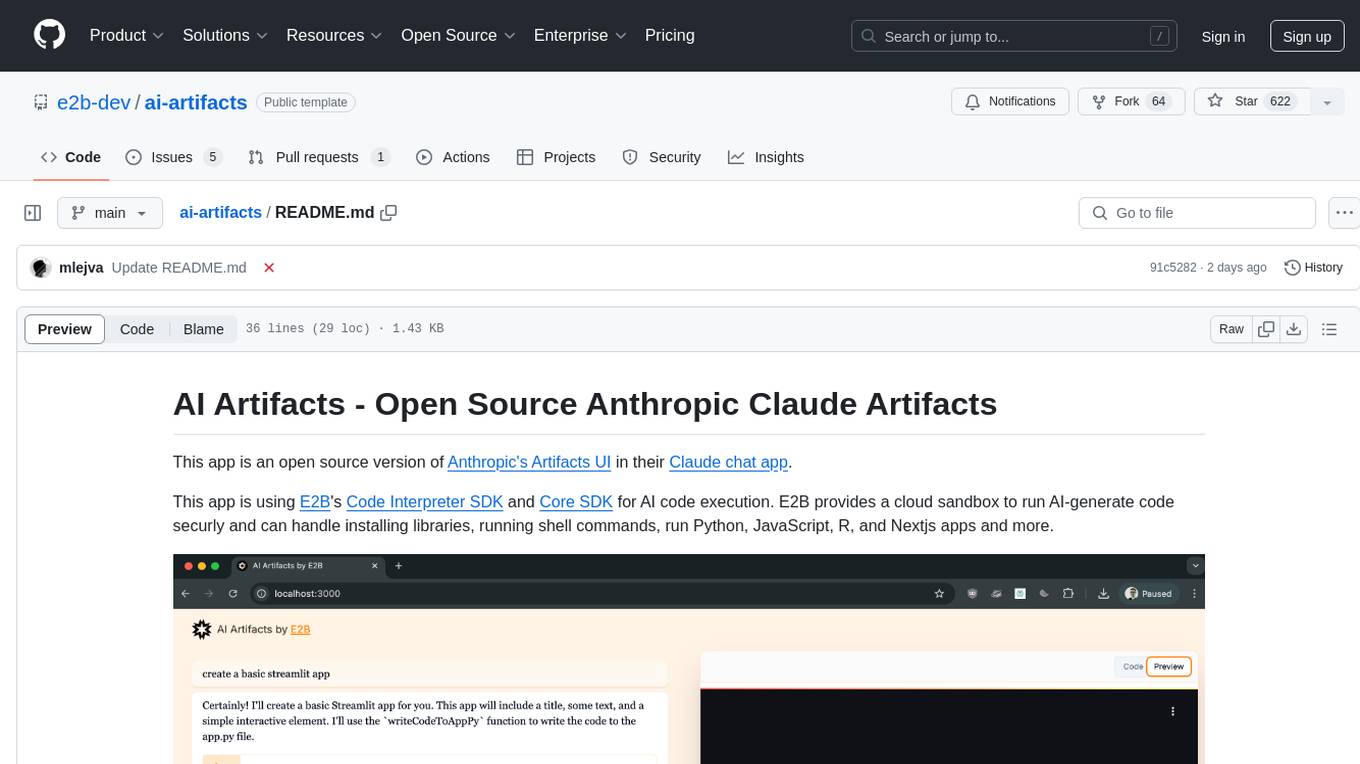
ai-artifacts
AI Artifacts is an open source tool that replicates Anthropic's Artifacts UI in the Claude chat app. It utilizes E2B's Code Interpreter SDK and Core SDK for secure AI code execution in a cloud sandbox environment. Users can run AI-generated code in various languages such as Python, JavaScript, R, and Nextjs apps. The tool also supports running AI-generated Python in Jupyter notebook, Next.js apps, and Streamlit apps. Additionally, it offers integration with Vercel AI SDK for tool calling and streaming responses from the model.
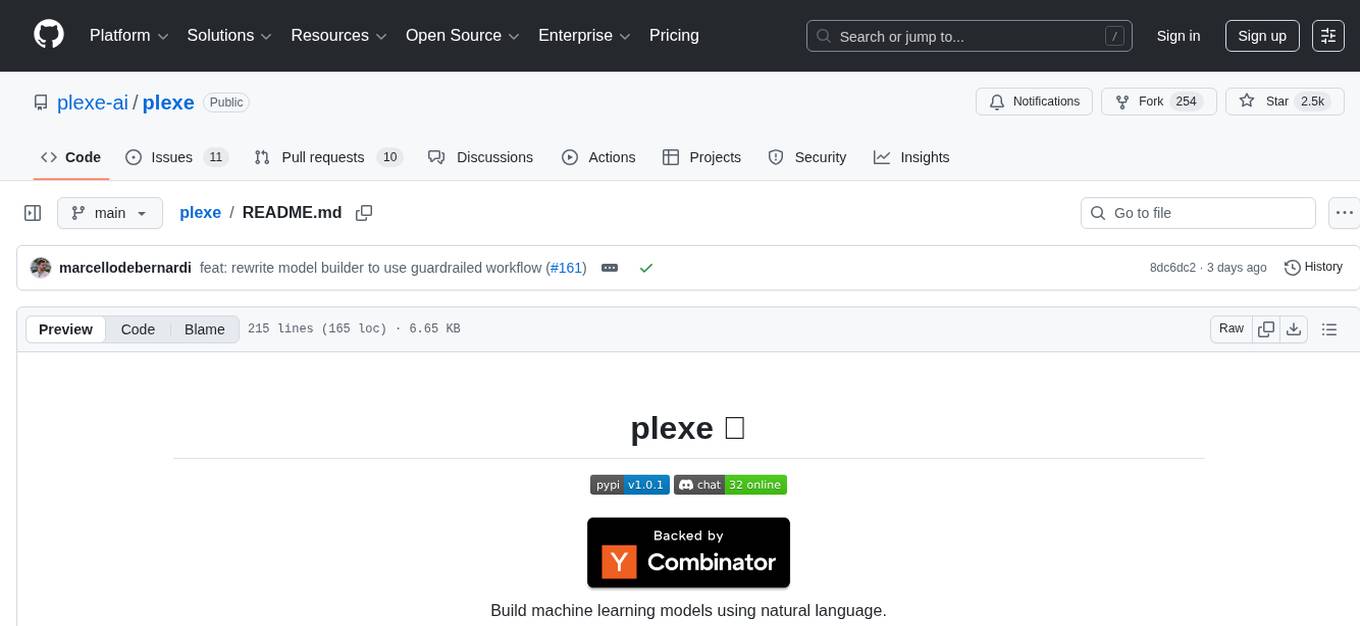
plexe
Plexe is a tool that allows users to create machine learning models by describing them in plain language. Users can explain their requirements, provide a dataset, and the AI-powered system will build a fully functional model through an automated agentic approach. It supports multiple AI agents and model building frameworks like XGBoost, CatBoost, and Keras. Plexe also provides Docker images with pre-configured environments, YAML configuration for customization, and support for multiple LiteLLM providers. Users can visualize experiment results using the built-in Streamlit dashboard and extend Plexe's functionality through custom integrations.
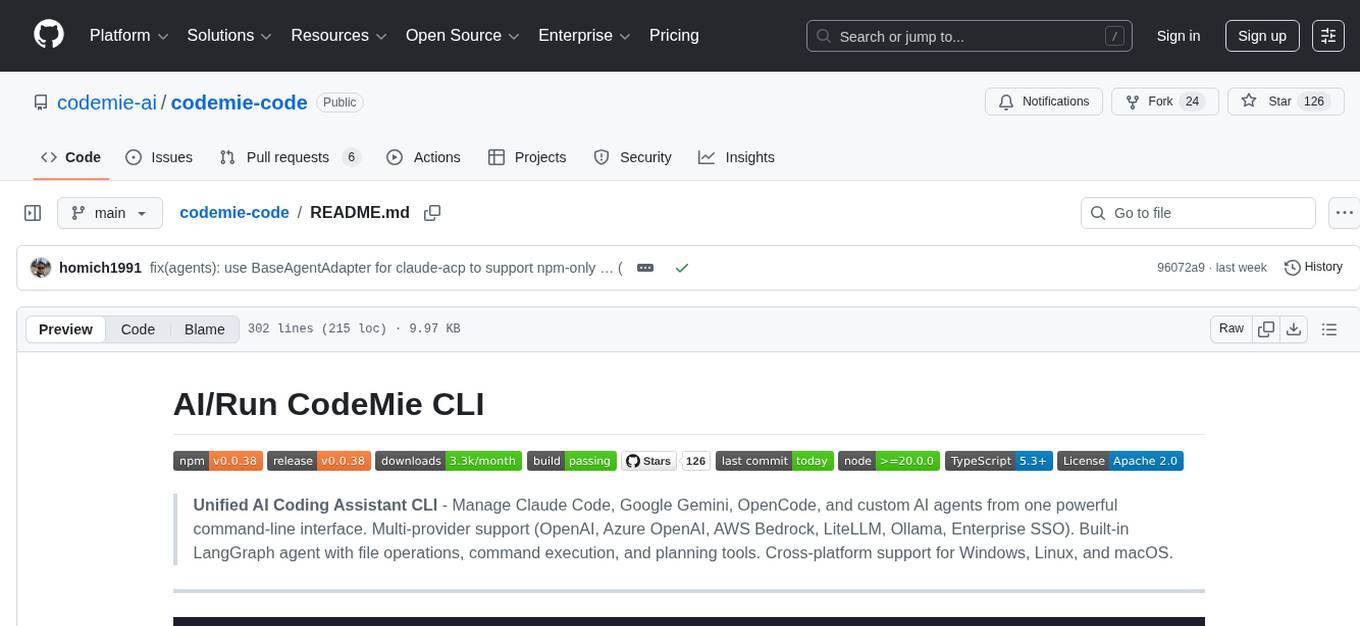
codemie-code
Unified AI Coding Assistant CLI for managing multiple AI agents like Claude Code, Google Gemini, OpenCode, and custom AI agents. Supports OpenAI, Azure OpenAI, AWS Bedrock, LiteLLM, Ollama, and Enterprise SSO. Features built-in LangGraph agent with file operations, command execution, and planning tools. Cross-platform support for Windows, Linux, and macOS. Ideal for developers seeking a powerful alternative to GitHub Copilot or Cursor.
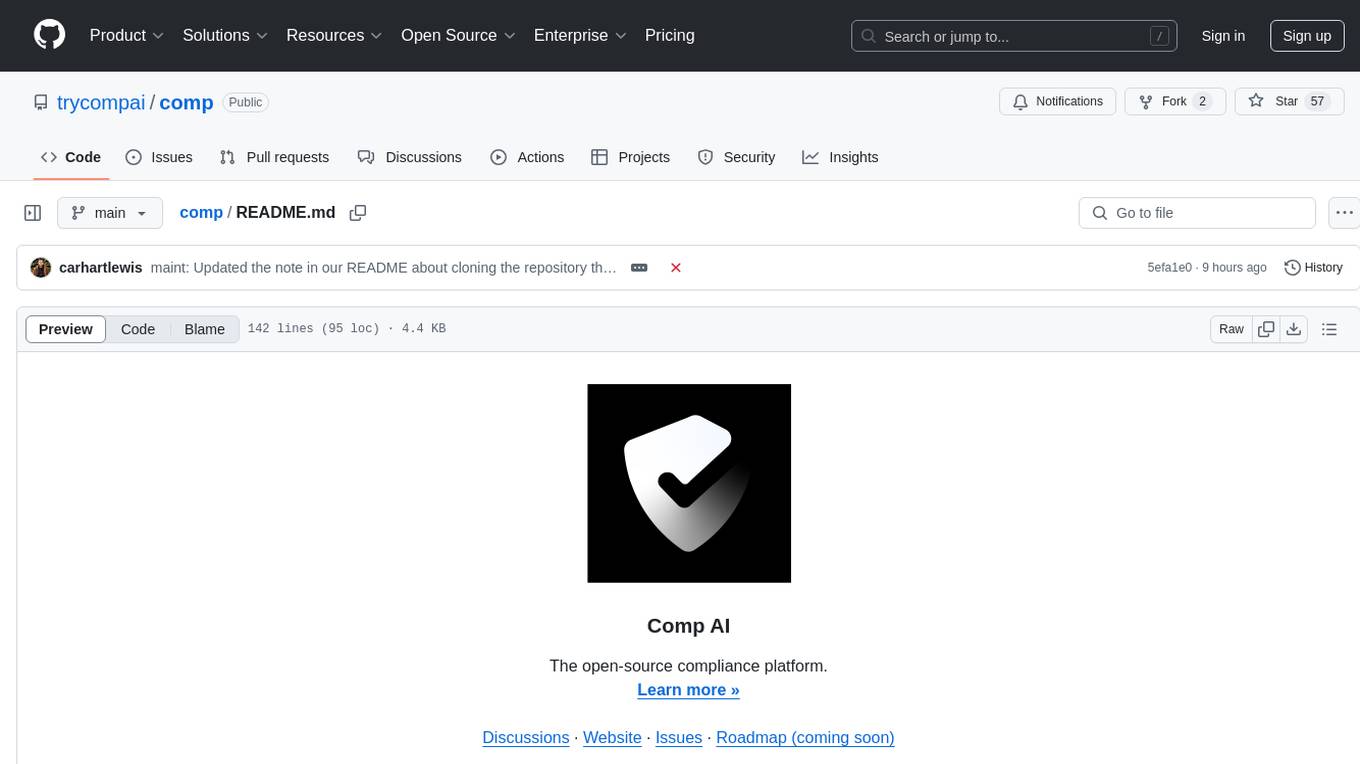
comp
Comp AI is an open-source compliance automation platform designed to assist companies in achieving compliance with standards like SOC 2, ISO 27001, and GDPR. It transforms compliance into an engineering problem solved through code, automating evidence collection, policy management, and control implementation while maintaining data and infrastructure control.
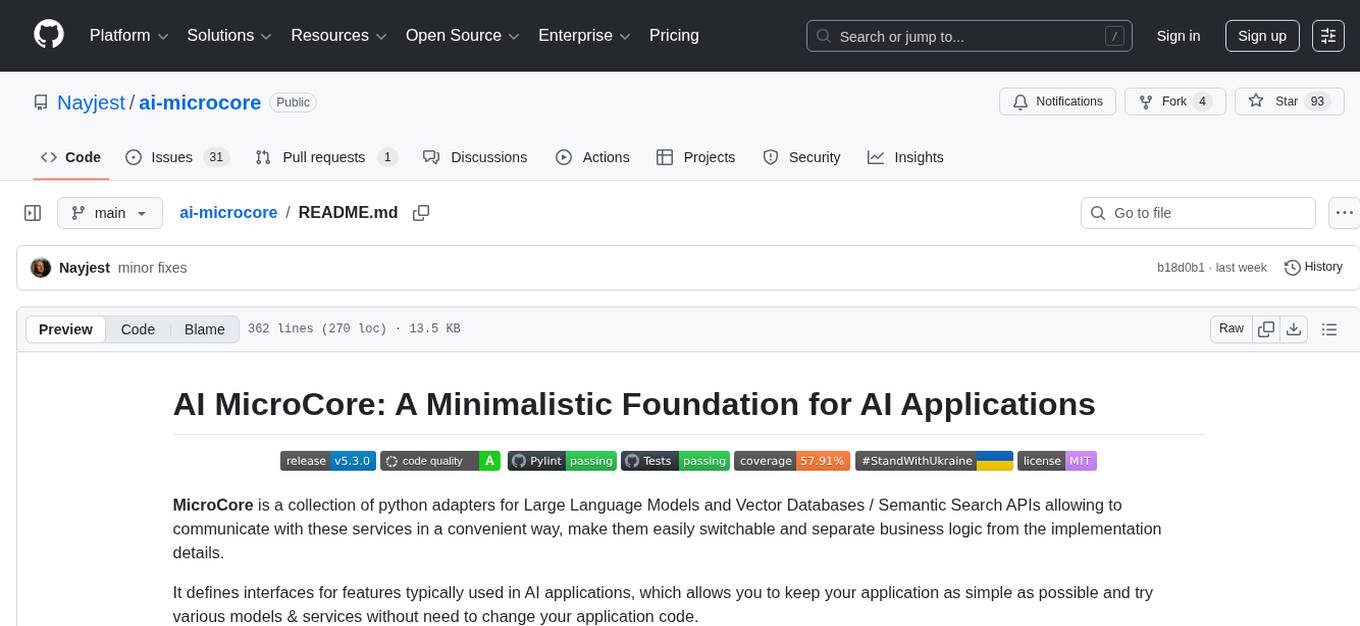
ai-microcore
MicroCore is a collection of python adapters for Large Language Models and Vector Databases / Semantic Search APIs. It allows convenient communication with these services, easy switching between models & services, and separation of business logic from implementation details. Users can keep applications simple and try various models & services without changing application code. MicroCore connects MCP tools to language models easily, supports text completion and chat completion models, and provides features for configuring, installing vendor-specific packages, and using vector databases.
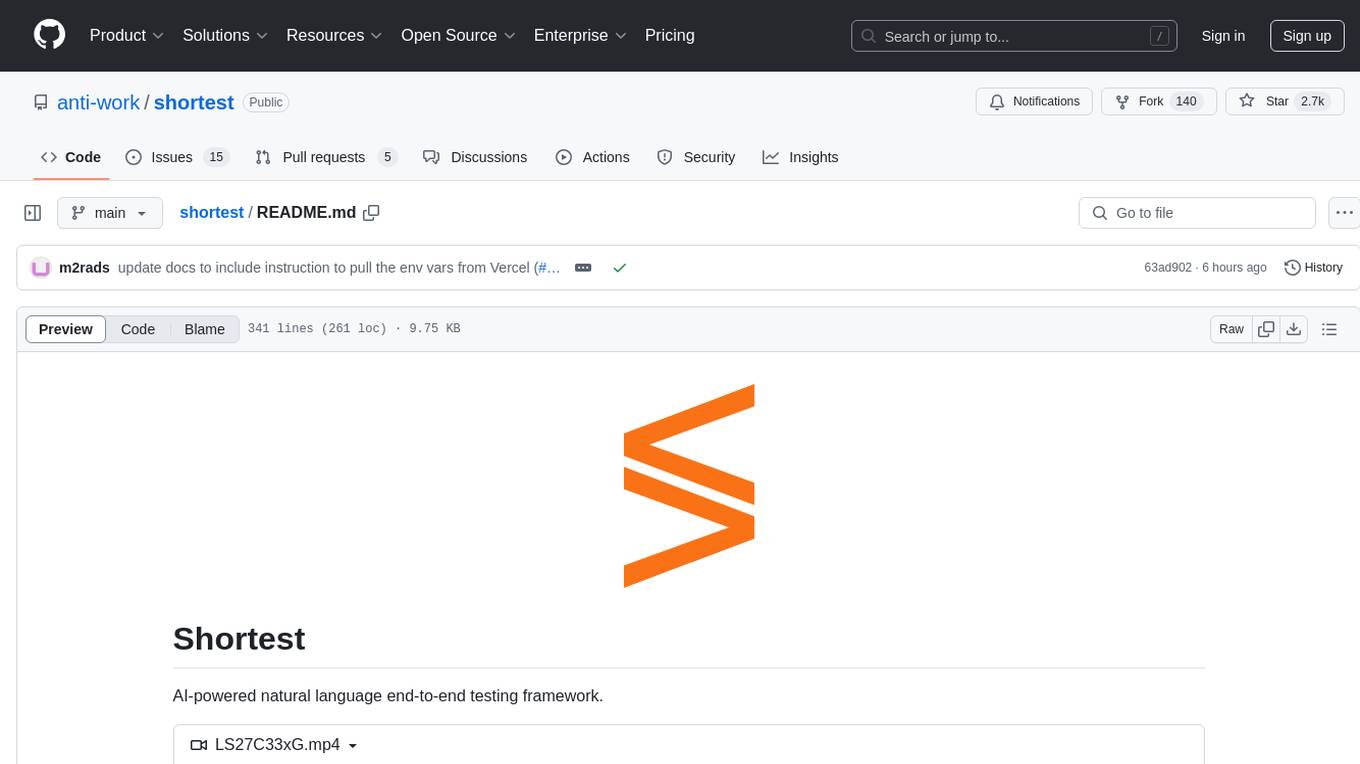
shortest
Shortest is an AI-powered natural language end-to-end testing framework built on Playwright. It provides a seamless testing experience by allowing users to write tests in natural language and execute them using Anthropic Claude API. The framework also offers GitHub integration with 2FA support, making it suitable for testing web applications with complex authentication flows. Shortest simplifies the testing process by enabling users to run tests locally or in CI/CD pipelines, ensuring the reliability and efficiency of web applications.
For similar tasks

starknet-agent-kit
starknet-agent-kit is a NestJS-based toolkit for creating AI agents that can interact with the Starknet blockchain. It allows users to perform various actions such as retrieving account information, creating accounts, transferring assets, playing with DeFi, interacting with dApps, and executing RPC read methods. The toolkit provides a secure environment for developing AI agents while emphasizing caution when handling sensitive information. Users can make requests to the Starknet agent via API endpoints and utilize tools from Langchain directly.
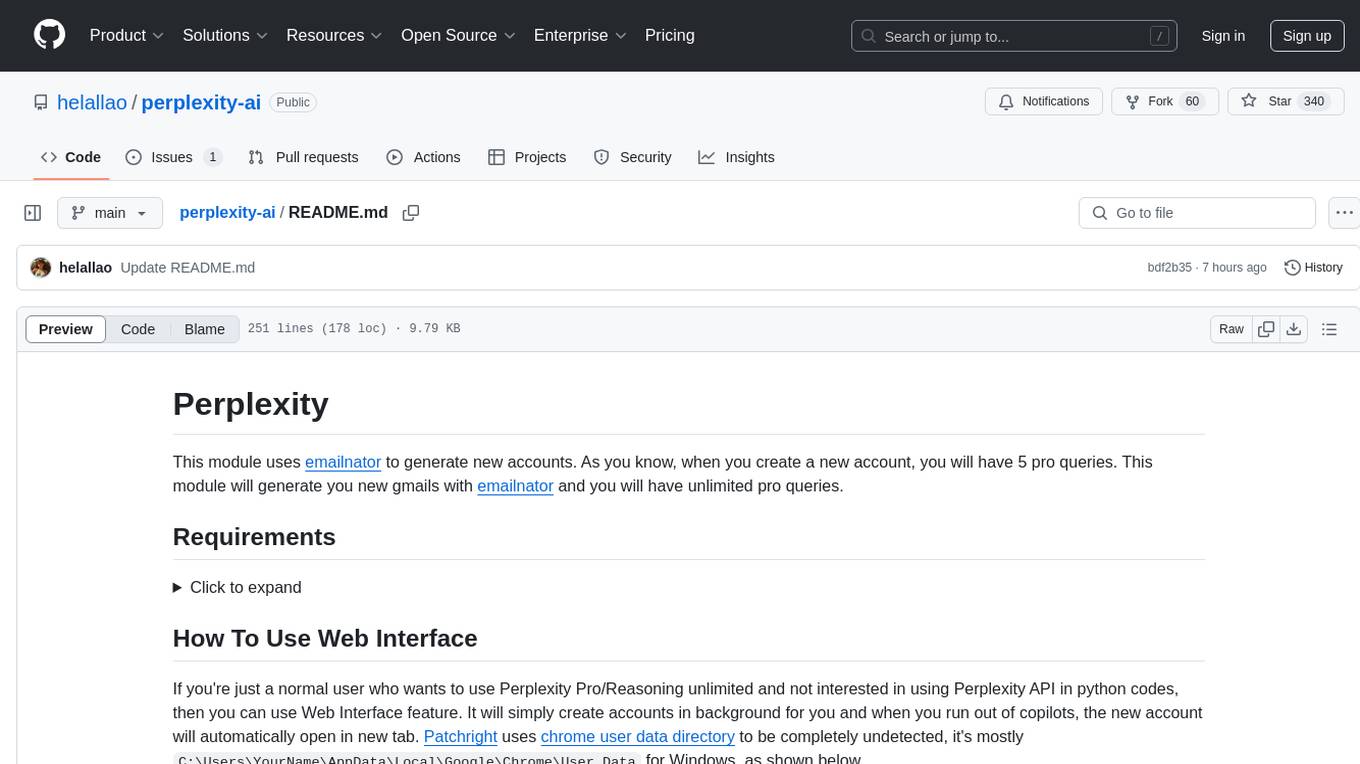
perplexity-ai
Perplexity is a module that utilizes emailnator to generate new accounts, providing users with 5 pro queries per account creation. It enables the creation of new Gmail accounts with emailnator, ensuring unlimited pro queries. The tool requires specific Python libraries for installation and offers both a web interface and an API for different usage scenarios. Users can interact with the tool to perform various tasks such as account creation, query searches, and utilizing different modes for research purposes. Perplexity also supports asynchronous operations and provides guidance on obtaining cookies for account usage and account generation from emailnator.
For similar jobs

sweep
Sweep is an AI junior developer that turns bugs and feature requests into code changes. It automatically handles developer experience improvements like adding type hints and improving test coverage.

teams-ai
The Teams AI Library is a software development kit (SDK) that helps developers create bots that can interact with Teams and Microsoft 365 applications. It is built on top of the Bot Framework SDK and simplifies the process of developing bots that interact with Teams' artificial intelligence capabilities. The SDK is available for JavaScript/TypeScript, .NET, and Python.

ai-guide
This guide is dedicated to Large Language Models (LLMs) that you can run on your home computer. It assumes your PC is a lower-end, non-gaming setup.

classifai
Supercharge WordPress Content Workflows and Engagement with Artificial Intelligence. Tap into leading cloud-based services like OpenAI, Microsoft Azure AI, Google Gemini and IBM Watson to augment your WordPress-powered websites. Publish content faster while improving SEO performance and increasing audience engagement. ClassifAI integrates Artificial Intelligence and Machine Learning technologies to lighten your workload and eliminate tedious tasks, giving you more time to create original content that matters.

chatbot-ui
Chatbot UI is an open-source AI chat app that allows users to create and deploy their own AI chatbots. It is easy to use and can be customized to fit any need. Chatbot UI is perfect for businesses, developers, and anyone who wants to create a chatbot.

BricksLLM
BricksLLM is a cloud native AI gateway written in Go. Currently, it provides native support for OpenAI, Anthropic, Azure OpenAI and vLLM. BricksLLM aims to provide enterprise level infrastructure that can power any LLM production use cases. Here are some use cases for BricksLLM: * Set LLM usage limits for users on different pricing tiers * Track LLM usage on a per user and per organization basis * Block or redact requests containing PIIs * Improve LLM reliability with failovers, retries and caching * Distribute API keys with rate limits and cost limits for internal development/production use cases * Distribute API keys with rate limits and cost limits for students

uAgents
uAgents is a Python library developed by Fetch.ai that allows for the creation of autonomous AI agents. These agents can perform various tasks on a schedule or take action on various events. uAgents are easy to create and manage, and they are connected to a fast-growing network of other uAgents. They are also secure, with cryptographically secured messages and wallets.

griptape
Griptape is a modular Python framework for building AI-powered applications that securely connect to your enterprise data and APIs. It offers developers the ability to maintain control and flexibility at every step. Griptape's core components include Structures (Agents, Pipelines, and Workflows), Tasks, Tools, Memory (Conversation Memory, Task Memory, and Meta Memory), Drivers (Prompt and Embedding Drivers, Vector Store Drivers, Image Generation Drivers, Image Query Drivers, SQL Drivers, Web Scraper Drivers, and Conversation Memory Drivers), Engines (Query Engines, Extraction Engines, Summary Engines, Image Generation Engines, and Image Query Engines), and additional components (Rulesets, Loaders, Artifacts, Chunkers, and Tokenizers). Griptape enables developers to create AI-powered applications with ease and efficiency.




